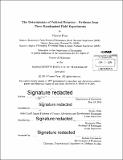| dc.description.abstract | My dissertation explores the political behavior of different groups, including immigrants, the youth, and uneducated and marginalized citizens - focusing on their registration and turnout decisions, as well as vote choices, political interest, and competence. I conducted three randomized field experiments in France and combined public electoral records with comprehensive phone and in person surveys to address the following questions: 1) What factors, including costs, information, and attitudes explain people's failure to register and vote, as well as their choice to vote for an extremist party, and 2) How do institutions and political campaigns affect these factors? In many countries (including the US) citizens must register before voting. The first chapter, coauthored with Céline Braconnier (Universite de Cergy-Pontoise) and Jean-Yves Dormagen (Universite Montpellier 1), provides experimental evidence on the impact of this additional hurdle on the size and composition of the electorate. Prior to the 2012 French presidential and parliamentary elections, 20,500 households were randomly assigned to one control or six treatment groups. Treatment households received home canvassing visits providing either information about registration or help to register at home. We show that France's registration requirements have significant effects on turnout and disproportionately discourage marginalized citizens on the left of the political spectrum. While both types of visits increased registration and turnout, the home registration visits had a higher impact than the information-only visits, indicating that both information costs and administrative costs are barriers to registration. Visits paid closer to the registration deadline were also more effective, suggesting that registration requirements' effects are reinforced by procrastination. Our design allows us to distinguish selection and treatment effects of home registration. We find that home registration included additional citizens who were only slightly less likely to vote than those who would have registered anyway, and did not reduce turnout among the latter. On the contrary, citizens induced to vote due to the visits also became more interested in the elections. Overall, these results suggest that the reduction of registration requirements could substantially increase political participation and improve representation of marginalized groups without debasing the average level of competence and informedness among voters. Immigrants in Europe have a low sense of national belonging that affects their well-being and social cohesion in the receiving societies. This low sense of belonging is often interpreted as the result of low socioeconomic status, lack of efforts to integrate, or stigmatization. The second chapter, coauthored with Guillaume Liegey, provides empirical evidence for a complementary theory centered on the paucity of outreach efforts extending a hand to immigrants. During the 2010 French regional elections, 1,350 buildings hosting 23,836 citizens were randomly assigned to receive canvassers' visits. Supporting our theory, the visits had a larger effect on immigrants' turnout than on the mainstream population, although their propensity to vote was initially similar. More broadly, exploring heterogeneous effects of an identical encouragement to vote is shown to usefully complement comparisons of turnout levels to assess the influence of factors such as immigrant origin and race on electoral participation and integration. Since the turn of the century, political campaigns have devoted increasing resources to door-to-door canvassing, in response to compelling evidence about the impact on voter turnout. However, we lack clear evidence on the impact of door-to-door canvassing on electoral outcomes, since unlike participation vote choice cannot be measured at the individual level with administrative records. The third chapter answers this important question with a countrywide precinct-level randomized experiment in France. During the 2012 presidential elections, 22,500 precincts and 17.1 million citizens were randomly allocated to either a control group or a treatment group. Treatment precincts were targeted by canvassers supporting Francois Hollande, the left-wing Parti Socialiste's candidate. The effects are estimated using official electoral results at the precinct level. The visits did not affect voter turnout, but they reduced the vote share of the far-right political party's candidate and increased Hollande's vote share at the first round. Overall, they contributed to one fourth of his victory margin at the second round. The effects persisted in the subsequent parliamentary elections, suggesting that they were obtained by persuading medium and high-propensity voters to vote left, rather than by mobilizing left-wing nonvoters and demobilizing opponents. The results suggest that personal contact can be an effective way for political parties to reconnect with disgruntled citizens and to win their votes.. | en_US |
